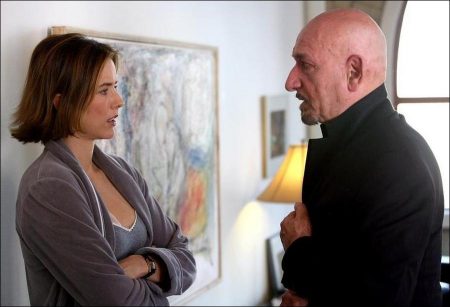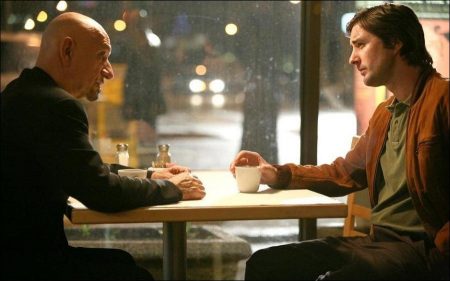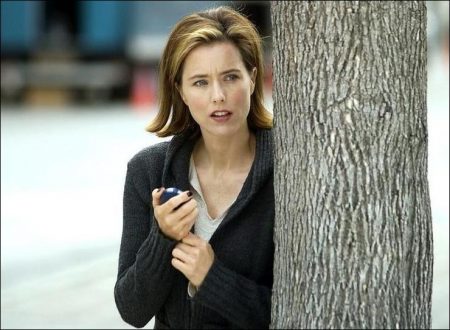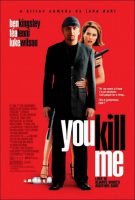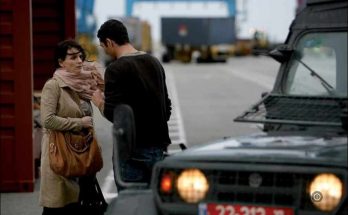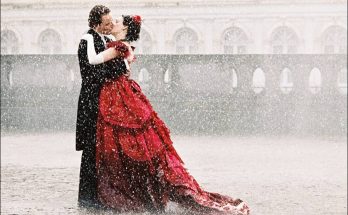Tagline: Love is always worth another shot.
Stylishly directed by John Dahl (Rounders, The Last Seduction), You Kill Me is the story of what happens when two mismatched people find a common calling. With dead-on performances by Ben Kingsley and Tea Leoni, You Kill Me is a street-smart mob comedy that scores a direct hit.
Buffalo, New York. The dead of winter. Frank Falenczyk (Ben Kingsley) is in the family business as a hit man for the Polish mob. But his drinking problem is getting in the way of his work. He’s the kind of guy who stores a bottle of vodka in the snow while shoveling the walk. When he blows a crucial assignment to knock off Edward O’Leary (Dennis Farina), the boss of the competing Irish gang, he’s called on the carpet. Family patriarch, the no-nonsense Roman Krzeminski (Philip Baker Hall), sends him off to San Francisco to dry out and clean up his act. Or else.
Frank doesn’t like it, but he has no choice. His cousin Stef (Marcus Thomas) takes him to the airport. In San Francisco, a friend of the family, the sleazy real estate agent Dave (Bill Pullman) sets him up with an apartment and a job at a mortuary, then sends him on his way to an Alcoholics Anonymous meeting. At first, the baring of souls and sharing of feelings is too much for Frank and he runs out of the meeting.
But Dave is watching him, so it’s back to AA for Frank. With the help of his sponsor Tom (Luke Wilson), a toll-taker on the Golden Gate Bridge, gradually he gets the idea and tries to stop drinking. Back east, O’Leary is squeezing Roman, threatening to put him out of business and out of Buffalo.
But things are looking up for Frank. He meets the tart-tongued Laurel (Téa Leoni) at the funeral home where he works. Frank is preparing her stepfather for the sweat hereafter and takes an instant liking to her when she bad-mouths the dead man. Eventually, he gets up the courage to call and ask her out. He’s nervous because he’s never gone on a date sober. His sponsor, Tom, isn’t sure it’s such a good idea and warns him that he might be rawer than he realizes with his newfound sobriety. So at dinner Frank promptly tells Laurel he’s in AA and that he’s unsure of himself. She finds his honesty refreshing. As long as he isn’t gay, it’s okay with her.
Keeping up his bout of honesty, Frank meets Tom at the tollbooth and confesses that he kills people for a living. Drinking was interfering with his work so he’s here to get sober so he can go back to killing people full time. Tom is taken aback, but as long as he doesn’t do it for recreation, he figures it’s okay with him.
Things are getting worse in Buffalo and Stef calls to say that he’s sending his wife and kids to Florida to stay out of harm’s way. Frank wants to know if he should come home but Stef says he should be glad to be out of there. Laurel seems to like Frank. She finds out where he lives (she tells his boss she’s from the AIDS clinic and has to get him test results) and turns up on his doorstep to invite him for dinner.
Frank never makes it. Working at an Irish wake, he is urged to have to have a drink, and can’t turn it down. So he has another, and another. Pretty soon, he’s celebrating with the family of the deceased, while Laurel and her pet turtle wait for Frank to show up. Finally, in the middle of the night, he turns up drunk at Laurel’s apartment and tells her what happened. And because he likes her, he also decides to tell her “everything you need to know.” Well almost everything.
Interview with Tea Leoni
Q: How did you get involved in the film?
A: I got a phone call from Ben Kingsley and I was hooked. It’s not everyday you get a call from Ben Kingsley. I thought it was a joke at first. And he said he wanted to talk to me about being in a film with him. So I had lunch with him and that was it. He was on the short list of people I wanted to work with. And John Dahl, he was on my short list of directors I wanted to work with. I really liked his work. I read the script and it seemed, from my point of view, flawless. So I thought I’d hit pay dirt. And that was how it came about.
Q: What attracted you about this character?
A: Well, I think reading the script the first thing that attracted me to her was the absence of back story and that bleeding monologue about why she’s so damaged. I thought that was such a relief. I think oftentimes you read scripts and, for an actress, in particular, somewhere between page 40 and 80, the woman sits down and talks about the terrible things that happened between she and her stepfather at age 12. And I was so relieved to read a script that had this bold confidence that it wasn’t needed. It gave me the sense that I would have some freedom in creating this character. And I also just thought it was an expression of confidence from John and the writers about what they had in the script and the movie that they wanted to make. And confidence in me.
Q: What was the biggest challenge for you in playing the role?
A: Maybe the hardest thing for me, as a mother of two kids who kind of light up the world, is to live inside of somebody whose point of view is not so lit up. I don’t think that she’s desperate or miserable in her loneliness, but there’s certainly a darkness and a quiet, and a lack of passion. We have a couple of funny moments in this scene where Frank takes Laurel bowling. And I don’t imagine Laurel’s really been out on a whim for a very long time. Maybe, thirteen years.
And he takes her to the mall and she, for some reason, goes for a corn dog. And this sort of awakening that happens inside of her is the real fun. It’s been a really fun to play as she’s falling in love with this man and literally her appetite for life is coming back.
Q: Why does she fall for Frank?
A: I think she falls for Frank because he’s straight with her. I think from how I see her, she thinks people are full of it. And whatever they’re presenting to you is not who they really are. She doubts the authenticity of anybody around her. I think she thinks she’s probably one up on everybody else, she knows they’re full of it before they do. And Frank is so completely uncomplicated because he is what he is. He tells her he’s a murderer and a drunk. And there’s no two sweeter words she could have heard, because what could possibly be hidden or worse than that? She has everything she needs to know right there and I think that that’s very seductive. I think there’s a real power exuded from that character.
Q: Nothing seems to surprise her. Even the scene at the AA meeting where Frank reveals that he’s hit man, she just seems to roll with it.
A: I think I wasn’t as focused on the moment while he’s saying all this stuff, other than I remember thinking how bizarre it was. I thought that was a very funny, bizarre moment, but what it was for me, what I focused on more, was the excitement that my character would feel. I think she’s thrilled. I can feel my heart in my chest. The excitement is because I know it all now. In fact, everybody knows it all. Afterwards, she says, ‘aren’t you even concerned about the police?
Like somebody’s going tell somebody?’ And he says, ‘it’s Alcohol Anonymous.’ I mean, his name is Frank. He is frank. He’s just absolutely with this conviction that is so innocent. I imagine this guy back with his family, almost like the dog that’s chained out to the little wooden replica of the house in the backyard. They call him in when they need him.
Q: He has a certain innocence and naiveté about him.
A: He’s almost like Chauncey Gardiner in Being There. His life has only been drinking and doing this, and being part of this family; that’s his legacy. I don’t think he knows the world. And I think the attraction for her is that there’s simpleness to him. And he is Sir Ben, and he’s sexy.
Q: So what was it like working with Sir Ben?
A: It was just a wonderful experience. He’s open, vulnerable, accepting, courageous, authentic, brave, charming, professional and sexy. He is the sexy beast. He’ll play all day off anything that you do. I think that acting is like a tennis match. When you play with somebody better it tends to bring your game up.
Q: How did you keep the balance between the absurd humor of the film and the reality of it?
A: I think your behavior; your actions can be as broad as the director asks you or as the tone of the film calls for, but you can’t ever wink. Your character can’t for a moment think it’s funny. And I think what actually makes it even funnier is just how much of that character’s life is at stake in that moment.
Q: You’re an executive producer on this film. How did that come about and what does that mean to you?
A: For the most part, it was protecting the integrity of the film. It was using my voice to say we’re making this film. I signed off on it. This is our funding. You agreed to it and this is the movie that we’re making. And it’s Ben and John and myself and the other actors and the other producers that we’ve hired making this movie. And there were times when there was a temptation to try to get more money to answer this problem or to fill in this hole. And Ben and I were both very strong and involved in not letting the film stray. It’s the integrity of the project—for better or worse. But we wanted to make that movie. And I think that’s what your role is as an executive producer.
Q: Had you produced before? Is it something you’d like to do more of?
A: It’s something I am doing a lot more of lately and I had always had a perspective on producing that was, well, less than flattering. And now that I’m doing it, I found that, wow, there’s a lot of creativity to be had as a producer. I’m really liking it. I just didn’t expect that.
Q: Do you feel like it’s a way to find good roles for yourself?
A: Sure. I think I’m pretty close to getting kicked out of Hollywood at 41, where there will be less and less available and certainly less and less interest. I think the studios are very concerned with their demographics and what sells ticket. And at a certain point you do have to put some effort into creating interesting projects for yourself that involve late 30s, early 40s women.
Q: You’ve done a number of comedies. Do you think of yourself as a comedic actor?
A: No, I don’t, but I keep waking up in comedies. Sure there are roles that I’ve played where I could say I think that was funny, or I think I made somebody laugh. But I guess I always think of the comedic actress as the people I watched growing up, you know, people like Lucille Ball and Bernadette Peters or Rosalind Russell. When you’re growing you think that people are funny on film must be really funny all day long, and I’m certainly not, and there are a lot of other comedic actors I’ve met who aren’t funny.
Q: So who are some of your influences?
A: Well, Lucille Ball, of course. I felt a special connection with her. There was something that really spoke to me about her work. Growing up, I thought it was really cutting edge. And, as it turns out, I was right. This great redhead, there’s something to watch there.
Q: Was there anything surprising or unexpected about making this movie?
A: No, it met my greatest expectations. I loved working with these guys. I would go out tomorrow and do anything with Ben or John. Life’s too short to work with people who are not in it for the fun and the art and the liveliness of it. And those two guys genuinely are. And I just really enjoyed it.
Q: What was it like shooting in Winnipeg?
A: You know, they say that if you go out on a first date, it is sort of important where you eat, that if the food is bad, it’ll sort of ruin the date. And on paper, it’s not a place that you would say, this is where I’m going for spring break. But I loved Winnipeg. And I think it was because, like in that first date metaphor, the food was good. It was like everything about it was good. I’d go back up to Winnipeg tomorrow with those guys and love it.
vYou Kill Me (2007)
Directed by: John Dahl
Starring: Philip Baker Hall, Ben Kingsley, Tea Leoni, Luke Wilson, Bill Pullman, Dennis Farina, Jayne Eastwood, Katie Messina, Tracy McMahon, Jayne Eastwood
Screenplay by: Christopher Markus, Stephen McFeely
Production Design by: John Dondertman
Cinematography by: Jeff Jur
Film Editing by: Scott Chestnut
Costume Design by: Linda Madden
Set Decoration by: Maryam Decter, Bruce Mailing
Art Direction by: Réjean Labrie
Music by: Marcelo Zarvos
MPAA Rating: R for language and violence.
Distributed by: IFC Films
Release Date: June 22, 2007
Views: 89
